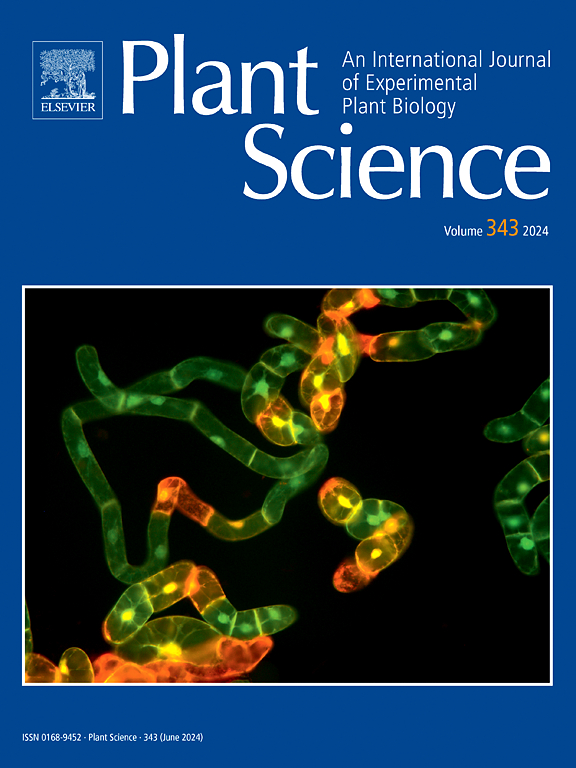Rapid Alkalinization Factor – A cryptide regulating developmental and stress responses
IF 4.2
2区 生物学
Q2 BIOCHEMISTRY & MOLECULAR BIOLOGY
引用次数: 0
Abstract
Post-translational modification is a key component that aids in regulated signaling cascades and complex cross talks in the plant cell to eventually facilitate efficient plant growth and development during the transition phases and in response to environment hindrances. Proteolytic processing, being one of the irreversible post-translational modifications, resulting in generation of mature peptide hormones from large precursor proteins, enhance the rapid responses, cell – cell communication including regulation of hormone signaling, basic cellular functions and defense activities. Often most of the proteolytic products are bio-active in nature and such peptides comprises the cryptome of the plant cell. The probability of generation of cryptides would be more via the unfolded or unstructured regions known as Intrinsic disordered regions which has higher sensitivity towards the proteases when compared to the structured regions. Similar to CLE, systemin, PSK (phytosulfokine) and RGF (Root growth factor), RALF, a small secreted cryptic peptide regulates the developmental and stress responses upon proteolytic cleavage. Apart from the identification and in-silico analysis of RALF peptides in different plant species, the role of these peptides in molecular signaling remains largely unknown. This review focuses on the perspective of RALF as a cryptic peptide explains the known roles of the peptide in developmental and stress responses. Further the roles of RALF in terms of molecular signaling are speculated to provide insights into complex growth, development and stress responses.
快速碱化因子-一种调节发育和应激反应的隐肽。
翻译后修饰是植物细胞中调控的信号级联反应和复杂的交叉对话的关键组成部分,最终促进植物在过渡阶段和对环境障碍的反应中高效生长和发育。蛋白水解加工是一种不可逆的翻译后修饰,使大前体蛋白产生成熟的肽激素,增强了快速反应,细胞间的通讯,包括激素信号的调节,细胞基本功能和防御活性。通常大多数蛋白水解产物在本质上是生物活性的,这些肽包括植物细胞的密码组。产生隐肽的可能性更大的是通过被称为内在无序区域的未折叠或非结构化区域,与结构化区域相比,该区域对蛋白酶具有更高的敏感性。与CLE、systemin、PSK (phytosulfokine)和RGF (Root growth factor)类似,RALF是一种小的分泌性隐肽,调节蛋白水解裂解时的发育和应激反应。除了在不同植物物种中对RALF肽的鉴定和计算机分析外,这些肽在分子信号传导中的作用仍然很大程度上未知。这篇综述侧重于从RALF作为一种隐肽的角度解释了该肽在发育和应激反应中的已知作用。进一步推测RALF在分子信号传导方面的作用,为复杂的生长、发育和应激反应提供见解。
本文章由计算机程序翻译,如有差异,请以英文原文为准。
求助全文
约1分钟内获得全文
求助全文
来源期刊

Plant Science
生物-生化与分子生物学
CiteScore
9.10
自引率
1.90%
发文量
322
审稿时长
33 days
期刊介绍:
Plant Science will publish in the minimum of time, research manuscripts as well as commissioned reviews and commentaries recommended by its referees in all areas of experimental plant biology with emphasis in the broad areas of genomics, proteomics, biochemistry (including enzymology), physiology, cell biology, development, genetics, functional plant breeding, systems biology and the interaction of plants with the environment.
Manuscripts for full consideration should be written concisely and essentially as a final report. The main criterion for publication is that the manuscript must contain original and significant insights that lead to a better understanding of fundamental plant biology. Papers centering on plant cell culture should be of interest to a wide audience and methods employed result in a substantial improvement over existing established techniques and approaches. Methods papers are welcome only when the technique(s) described is novel or provides a major advancement of established protocols.
 求助内容:
求助内容: 应助结果提醒方式:
应助结果提醒方式:


